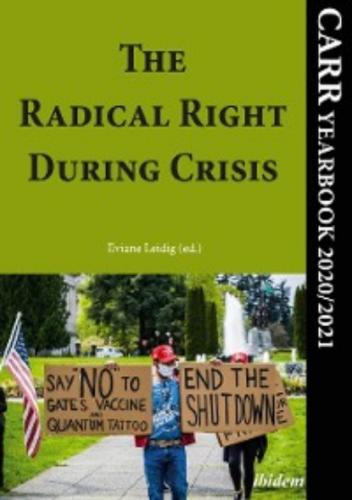The Radical Right During Crisis. Группа авторов
supported by a European Research Council Starting Grant (TAU17149) “Between the Times: Embattled Temporalities and Political Imagination in Interwar Europe”.
1 Karl Popper, The Open Society and Its Enemies, vol II. The High Tide of Prophecy, Hegel, Marx, and the Aftermath (London: Routledge, 1945), 270.
2 Bertrand Russell, A History of Western Philosophy (London: George Allen, 1946), 735.
3 See Isaiah Berlin, “Historical Inevitability,” (1953), in Liberty, the Collected Essays of Isaiah Berlin, ed. H. Hardy (Oxford: Oxford University Press, 2008).
4 Kirk Willis, “The Introduction and Critical Reception of Hegelian Thought in Britain 1830-1900”, Victorian Studies 32 no. 1 (1988): 87-111, 103-4.
5 Willis, “Introduction,” 104.
6 Andrew Vincent, “German Philosophy and British Public Policy: Richard Burdon Haldane in Theory and Practice”, Journal of the History of Ideas 68 no. 1 (2007): 157-179.
7 Willis, “Introduction”, 8.
8 Willis, “Introduction”, 7.
9 Leonard Hobhouse, The Metaphysical Theory of the State (London: George Allen, 1918).
10 A. James Gregor, Mussolini’s Intellectuals: Fascist Social and Political Thought (Princeton: Princeton University Press, 2005), 86.
11 Gregor, Mussolini’s Intellectuals, 114.
12 See Lisa Herzog, ed., Hegel’s Thought in Europe: Currents, Crosscurrents and Undercurrents (Basingstoke: Palgrave Macmillan, 2013).
13 Walter Kaufmann, From Shakespeare to Existentialism: Studies in Poetry, Religion, and Philosophy (Boston: Beacon Press, 1959), 88-119.
The ‘Silent Majority’: Populist Cliché or Warning?
Aristotle Kallis
In the run-up to the EU referendum in Britain in June 2016, at a time when the Remain vote was apparently enjoying a modest but clear advantage, one of the numerous opinion polls focused on public attitudes to immigration and on how this might affect the popular vote.1 When asked to assess immigrants’ contribution to British economy, responses were split evenly between those acknowledging immigrants’ contribution to the economy and those questioning it. Yet very strong affirmative majorities were recorded by the same poll in response to questions about Britain being “overcrowded”, about the need to “significantly” restrict immigration through tighter border controls, to limit migrants’ access to public services, and so on. When interviewees were asked to identify the one issue that could sway their vote in the referendum, respondents singled out immigration by a spectacular margin. Unfortunately, we know too well how this played out.
As the history of opinion polling shows, such social majorities can however be mercurial and hard to gauge. Societies typically host a wide spectrum of views on any given issue and, while it may be relatively easier to talk of “extremes”, the mainstream-as-majority view is often very hard to ascertain or deduce.2 Opinion polls go some way towards capturing the mood of society in a more focused, issue-specific format but they can also be misleading: their results hinge on the way the question is framed, the moment when or the medium through which it is asked, and the group that is sampled. Such parameters may all skew the findings,3 in some cases deliberately or as in most cases unintentionally. Thus, to talk of “social majorities”—or the general will of a population—is very often a wishful projection or and educated guess with a very limited shelf life indeed.
Part of the problem is that social majorities do not always have a voice or a desire to speak loudly enough to be captured by the radar of public mood. Noisy minorities4 can easily skew impressions as much as boisterous leaders claiming that they bespeak the “real” majority view.
Meanwhile, the existence of social taboos about the public expression of particular views in any society may lead to tactical form of public self-censorship—a divergence between the private and publicly expressed views of the individual. ‘Regimes of truth’, Foucault perceptively argued,5 always produce ‘subjugated knowledges’—views and voices that have been de-legitimised and suppressed by a hegemonic discourse seeking to regulate knowledge and therefore public discourse itself.
When Nixon, for example, invoked the “silent majority” as the source of his popular mandate6 and Vice President Agnew spoke of a small “liberal elite” as the exclusive source of “truth” in their contemporary America,7 the elected presidential duo effectively questioned all sorts of orthodoxies about the country’s “mainstream” society. The trope of the “silent majority” lay claim to a social majority that has been ignored, misrepresented by biased media, effectively silenced, and forgotten. It sounds anti-elitist and liberating, mixing lofty principles such as freedom and democracy with the call for radical change. For decades it and its various by-products like the “real people” and so on8 have become the discursive staple of right-wing populists across the world,9 uniting the language of very different figures such as Geert Wilders, Marine Le Pen and, more recently, the Tea Party and of course Donald Trump.10 It has also become a favourite electoral stratagem for mainstream political campaigns, such as Vote Leave for the 2016 EU membership referendum in the UK or a series of elections in the 2000s fought by Nicolas Sarkozy as either incumbent or aspiring president.
The populist “silent majority” trope has been repeatedly exposed as a cynical misnomer11 and disparaged by mainstream media and academic research.12 It may be exactly that of course. Populist forces have rarely reached the status of expressing the views of
